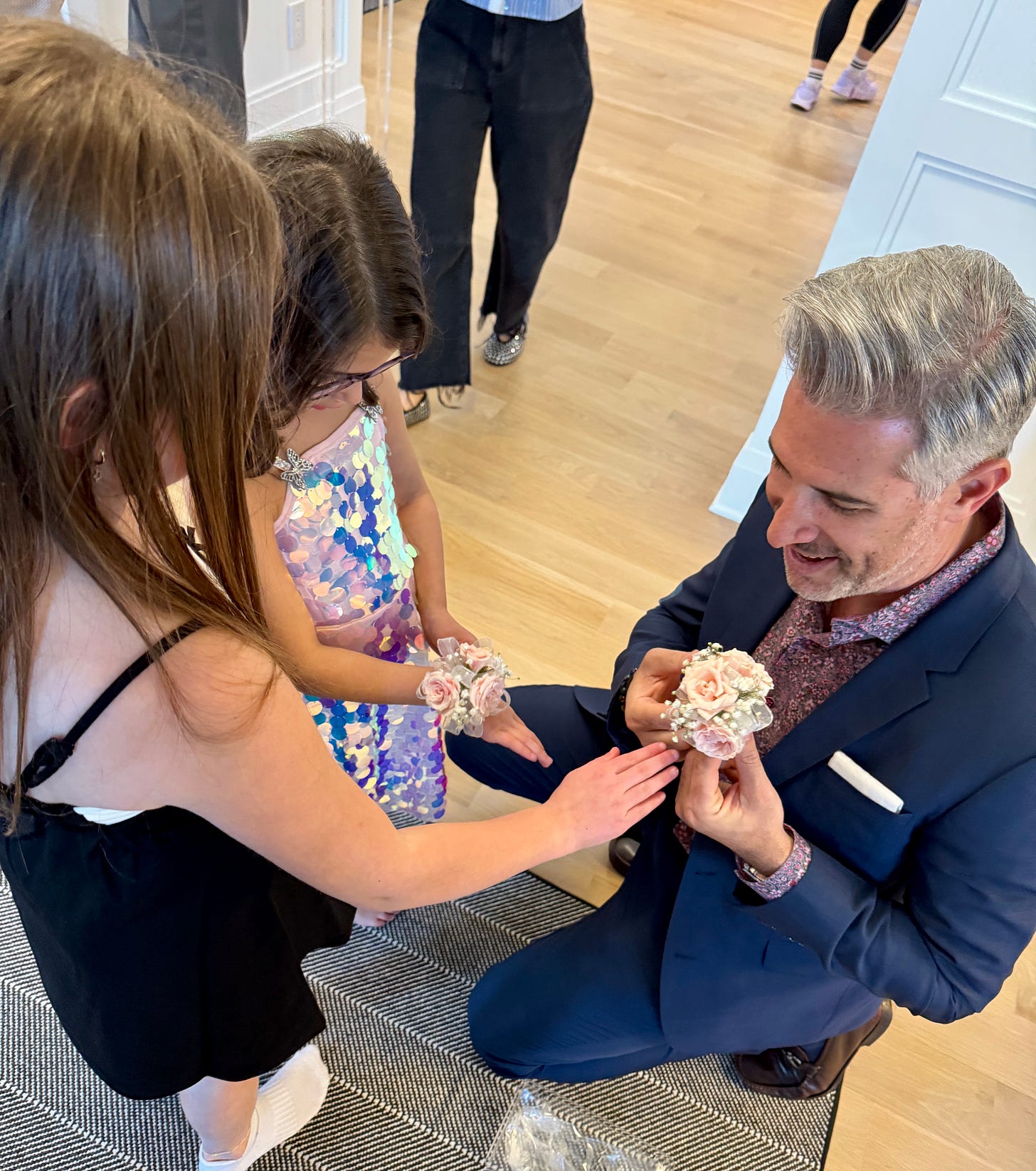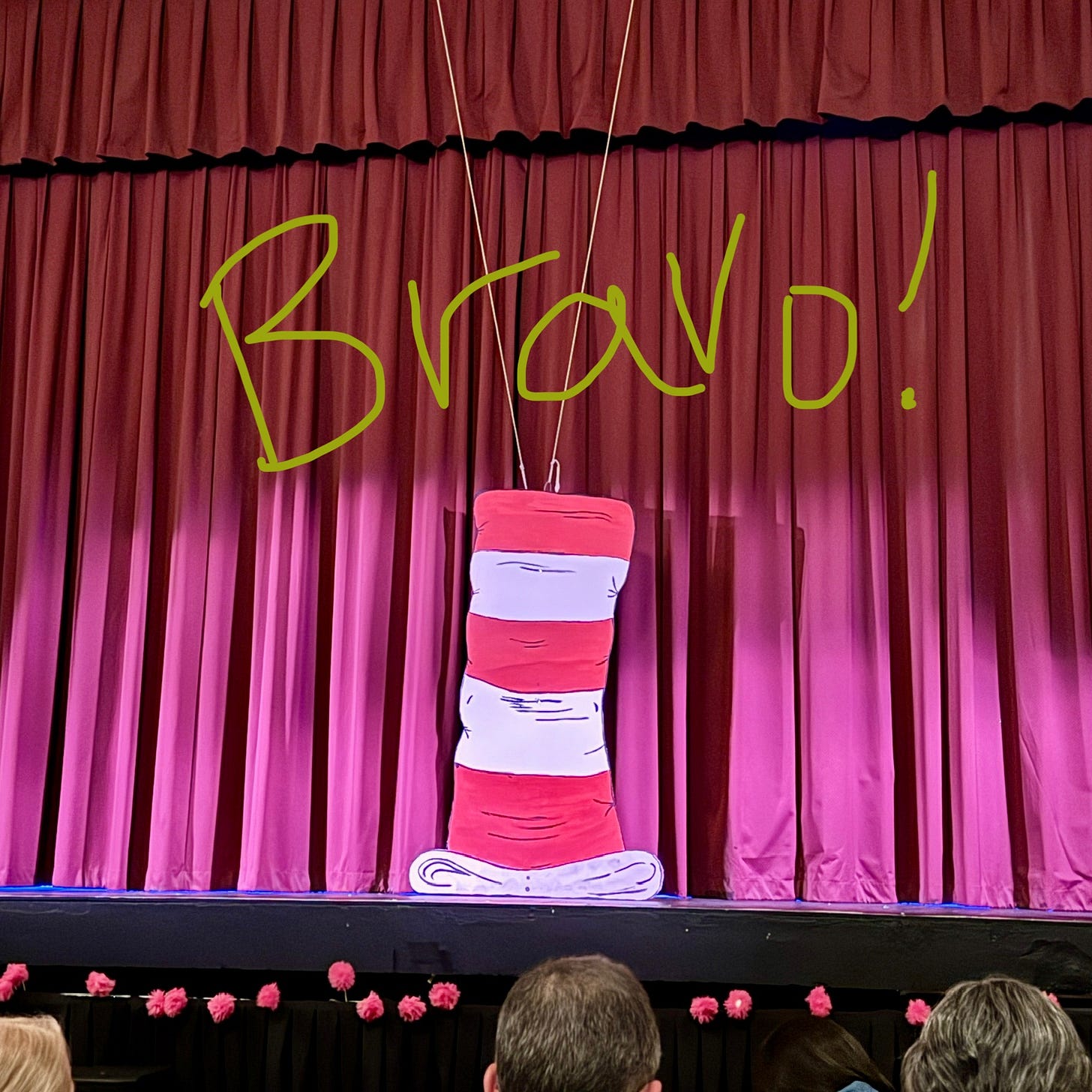Show your work, fellas!
Dads who caregive loud and proud move the needle for all of us.
We’ve come a long way.
At the tail end of the pandemic and after much deep reflection, Doug became Swim Dad. He learned to handle the entire life cycle of Hazel’s swim season from the first swimsuit purchase through the state championship meet, leaving me with nothing to do for this extracurricular activity except show up and clap. For the first time, I got to be a Parent Passenger Princess, and it felt damn good for both of us.
Since then, Doug has taken even more duties off my plate: breakfasts; drop offs; dishes; birthday parties; doctor’s appointments; dinners during grill season. I will always own certain tasks, and we both know my mental checklist for the family will always be longer, but he makes up for it by assuming more of the straightforward tasks that he can do to ease my burden. In terms of the division of labor in our home, we are as close to fair as we’ve ever been. I feel like a human being again, and he feels like a contributor in more ways than one.
With Father’s Day just around the bend, I want to talk about the labor of men. Some of you are doing a fantastic job. Others could benefit from seeing that.
But let’s back up a second. A big message in our forthcoming book is about contribution. We need to broaden the scope of what it means to “contribute” to your family. Our goal is not only to unseat *earning money* as the ultimate measuring stick of self-worth with respect to your spouse but to elevate caregiving as an equally powerful means of supporting your loved ones.
Caregivers are providers, too.
Our desire to change the caregiving narrative goes beyond my aspirations to shed light on women’s invisible labor, though I’ve certainly experienced how we reap the net benefits of this work. I think it’s better to elevate caregiving as a whole, because caring for others makes us better people. It adds context and richness to our lives. This is not a gender-specific or parent-specific function.
I can say with confidence from our book interviews that no one’s looking back with age and saying they wished they put ten hours a week more into their jobs. It’s quite the opposite. We hold onto how we cared, and who cared for us.
Everyone should be promoting the ways they care, because doing so lends real-world support to policies that address the challenges today’s families face. Women will not get us there by screaming into the void on their own (though we try…lord knows, we try). With almost any social issue in recent history, we’ve seen that the voices of the most afflicted need other groups to adopt their mission and force-feed that change into existence.
In the context of household equity, male allyship looks like:
championing policies that create enough financial and literal space for families to make caregiving decisions in the best interests of all parties involved;
doing the actual work; and
showing the actual work.
That third one’s the ticket. We need men to show up and show off for real change to happen.
Take paid family leave, for example. The U.S. Bureau of Labor Statistics reports that only about 27 percent of private industry workers had access to paid family leave in 2024. Out of that woefully small subset, it’s true that more and more of those claiming their full benefits are men. According to Parento, male paid parental leave absences have increased by 183% since 2018. This is truly amazing, but most available statistics probably don’t capture the nuance behind it. States with mandated benefits obviously will see the highest percentage of women and men taking full advantage due to job protections and increased social acceptance in those areas. What I’d view as an even more encouraging measurement of progress would be knowing that more men—as a matter of principle—are taking full advantage of robust parental leave policies offered by their employers on a voluntary basis.
Across industries, there’s still a wide delta between tolerance and acceptance. Cultural shifts don’t occur until there’s acceptance. For this to happen, as we point out in our book, more men need to take the full paternity leaves offered to them. Even if they’re worried about how colleagues perceive them, or they don’t want to, or they don’t think it’s necessary from a logistics standpoint. Leaving the benefit unused reinforces an argument that families don’t need it—that the moms are doing just fine on their own. Putting a stake in the ground and using it says the opposite. It says that this is acceptable, and this should be the norm.
Of course, it doesn’t end there.
This is why men need to keep showing their work at home. Doing what’s asked of you is just the beginning. You’ve got let people see you plug away at your full multi-hyphenate list of responsibilities; people like your buddies, your bosses; your mother-in-law who loves to remind your wife how lucky she is to have a husband who is willing to babysit his own children (ehh). Women can be voices of change on this issue, but you can be agents of change. There’s so much to be proud of not only when you step up and do things differently, but also when you hold yourself out to the world as a man who prioritizes his responsibilities as a parent and a partner. You can provide in more ways than one, and you need to be told that, too.
I don’t want you to think I don’t understand why this is so hard. I just spent two years learning about how people become the way they are, and how difficult it is to change the messages we’ve embodied since childhood. That doesn’t mean it’s not worth trying. We all have the ability to create better practices for ourselves, our partners, and our kids. And you have no idea how many lives you can impact by modeling those practices to others.
A cool thing I witnessed with Doug was how quickly the floodgates of confidence opened. When he started doing more, he began to worry less about doing it wrong. He started to own more. I started to stress less. And I think, he has generally become much prouder of how hard he works in this facet of his life. Now, he does it because he wants to—not because he has to—and he shares it with anyone who asks (and many who don’t)!
When I started envisioning this newsletter, I was sitting in the Trader Joe’s parking lot on a Saturday morning. I had stopped in for some flowers and to scope out the seasonal treats (as one does). This wasn’t on my invisible to-do list; but rather, it was something I wanted to do and had the capacity to do because my husband had organically taken over the Saturday morning routine of driving one daughter to and from dance and taking the other with him for a bagel date so that I could rest alone. I never asked for this hour. I just received it.
What I find most beautiful about this whole thing is that I’m not the only beneficiary: the girls benefit most of all. Doug models for them what they should expect from a partner someday and all the ways they can provide. These are the lessons. We learn from what we see.
Men, we want to see more of your work.
Email us some of the things you’re most proud of that you do for your family. I guess they can be money-related, though I’d hope you can come up with something else just as valuable. We’ll share some of our favorites before Father’s Day next week.
Are there any words to describe the pure joy of a former theater kid watching her own daughter turn into a theater kid? I’m sure there are, but I’m too tired to find most of them. Last weekend, Hazel performed in her first local community musical: Seussical. She’s hooked. Pride is only a piece of how I feel—the excitement for what’s to come is even better.
TJA in the news
For CNBC, Douglas warned of the dangers of Buy-Now-Pay-Later services, and spoke about how Americans worried about Social Security benefits drying up can plan ahead.
Shameless plugs
Are you a brand or business interested in reaching The Joint Account’s 14,000+ subscribers?
Would your organization benefit from having us talk about love and money?
We’d love to hear from you.
And don’t forget, our forthcoming book, Money Together: How to find fairness in your relationship and become an unstoppable financial team, arrives in October 2025. You can pre-order your copy now!
Find us on social: @dougboneparth + @averagejoelle :)
The content shared in The Joint Account does not constitute financial, legal, or any other professional advice. Readers should consult with their respective professionals for specific advice tailored to their situation.




